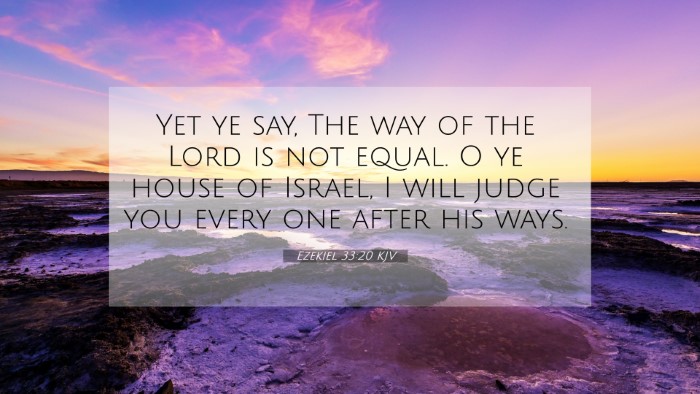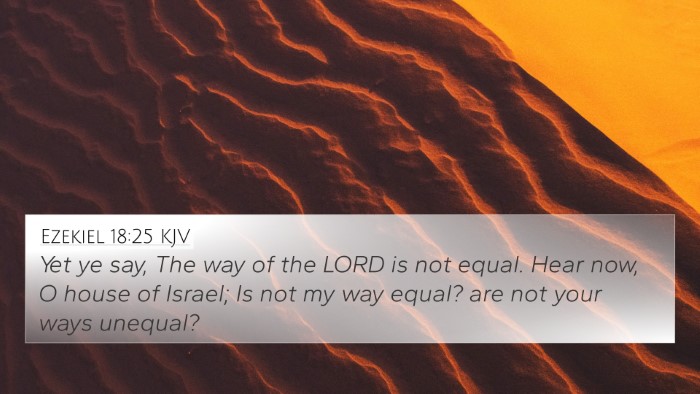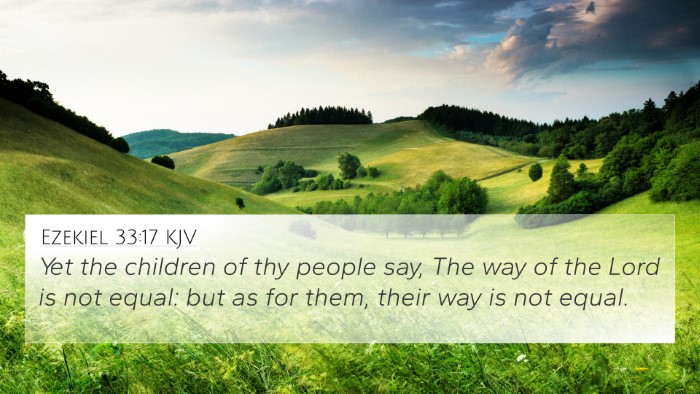Ezekiel 33:20 - Summary and Interpretation
Ezekiel 33:20 states:
"Yet ye say, The way of the Lord is not equal. O ye house of Israel, I will judge you every one after his ways."
This verse addresses a common complaint among the Israelites during the time of Ezekiel, emphasizing God's justice in the face of their misunderstanding of His ways.
Meaning and Insights
The verse captures a critical reflection on divine justice. Ezekiel speaks on behalf of God, who responds to the people's accusations of unfairness. Here's a consolidated interpretation:
-
Divine Justice:
Both Matthew Henry and Adam Clarke highlight God's equitable nature. Despite the people's claims of God's ways being unjust, the text confirms that He evaluates each individual's actions fairly.
-
Human Perception:
Albert Barnes notes the discrepancy between God's judgments and human perception. The Israelites fail to see that their own actions lead to their misfortunes, thus blaming God for their predicament.
-
Call to Accountability:
Henry emphasizes the need for individual accountability before God. The people are reminded that their judgment is based on their own ways, encouraging personal introspection and responsibility.
-
Transition from Judgment to Redemption:
There is a recurring theme that despite judgment, God's ultimate goal is redemption. This notion is linked to the larger narrative of restoration in the Book of Ezekiel, as pointed out by Clarke.
Cross-References and Thematic Connections
To enhance understanding, here are cross-references related to Ezekiel 33:20:
- Isaiah 30:18: The Lord longs to be gracious and rise as a savior, showing His inclination towards mercy after judgment.
- Jeremiah 17:10: God searches the heart and examines the mind, illustrating His justice in judging individuals according to their deeds.
- Romans 2:6-8: Paul discusses how God will repay everyone according to their deeds, echoing the theme of personal accountability.
- Matthew 7:2: The measure you use will be measured to you, reinforcing the idea of divine equality in judgment.
- Galatians 6:7: A person reaps what they sow, alluding to the direct consequences of one's actions outlined in Ezekiel.
- Ezekiel 18:30: A call to repentance emphasizes the possibility of turning from sin to avoid judgment.
- Hebrews 10:30: God's judgment is not just; He avenges, reminding that He knows the hearts of individuals.
Understanding Connections between Bible Verses
The verse functions as a bridge in understanding God's justice and human responsibility wisely. When conducting a comparative Bible verse analysis, several patterns emerge:
-
Linking Themes of Justice and Mercy:
Through careful cross-referencing, we discern how themes of divine justice are intertwined with God's mercy across both the Old and New Testaments.
-
Inter-Biblical Dialogue:
Ezekiel's words resonate with New Testament teachings, illustrating how God’s nature has been consistent throughout Scripture. The linkage of Old Testament prophetic voices to the teachings of Jesus and the Apostles offers rich theological insights.
-
Thematic Connections in Prophetic Literature:
By examining prophetic themes in Ezekiel alongside other prophets, we can outline patterns of warning, judgment, and ultimate hope, showcasing God’s comprehensive plan for humanity.
Tools for Bible Cross-Referencing
Utilizing Bible concordance can be beneficial for those seeking to delve deeper into the meanings of various scripture passages. These resources allow for:
- Finding cross-references to enhance study and sermon preparation.
- Identifying connections between Old and New Testament that provide insights into the fulfillment of prophecies.
- Utilizing cross-reference Bible study methods to observe thematic Bible verse connections.
Conclusion
Ezekiel 33:20 serves as a profound reminder of God's just nature and the accountability each individual holds before Him. Through a careful examination of this verse along with its cross-references, readers can gain a broader understanding of God's expectation of justice, mercy, and personal responsibility.













